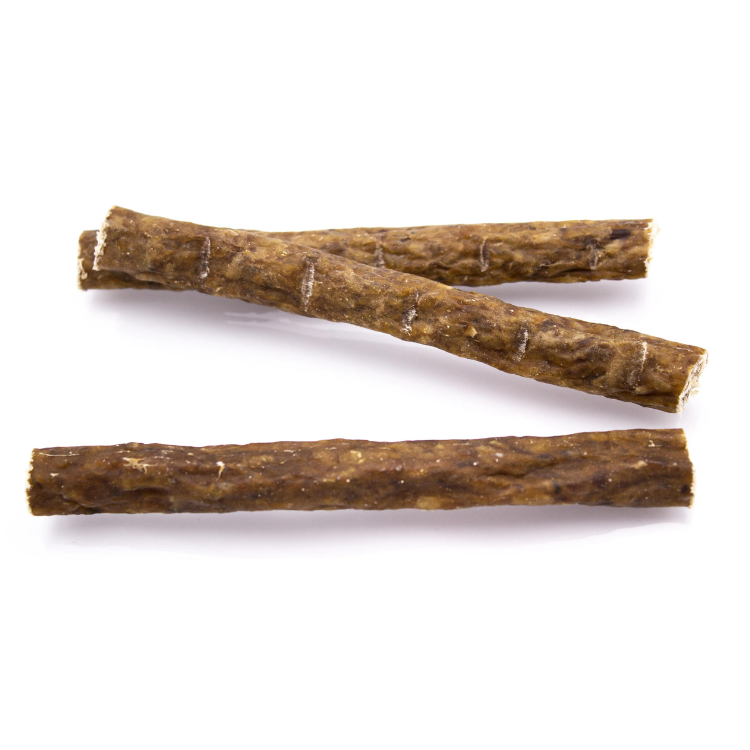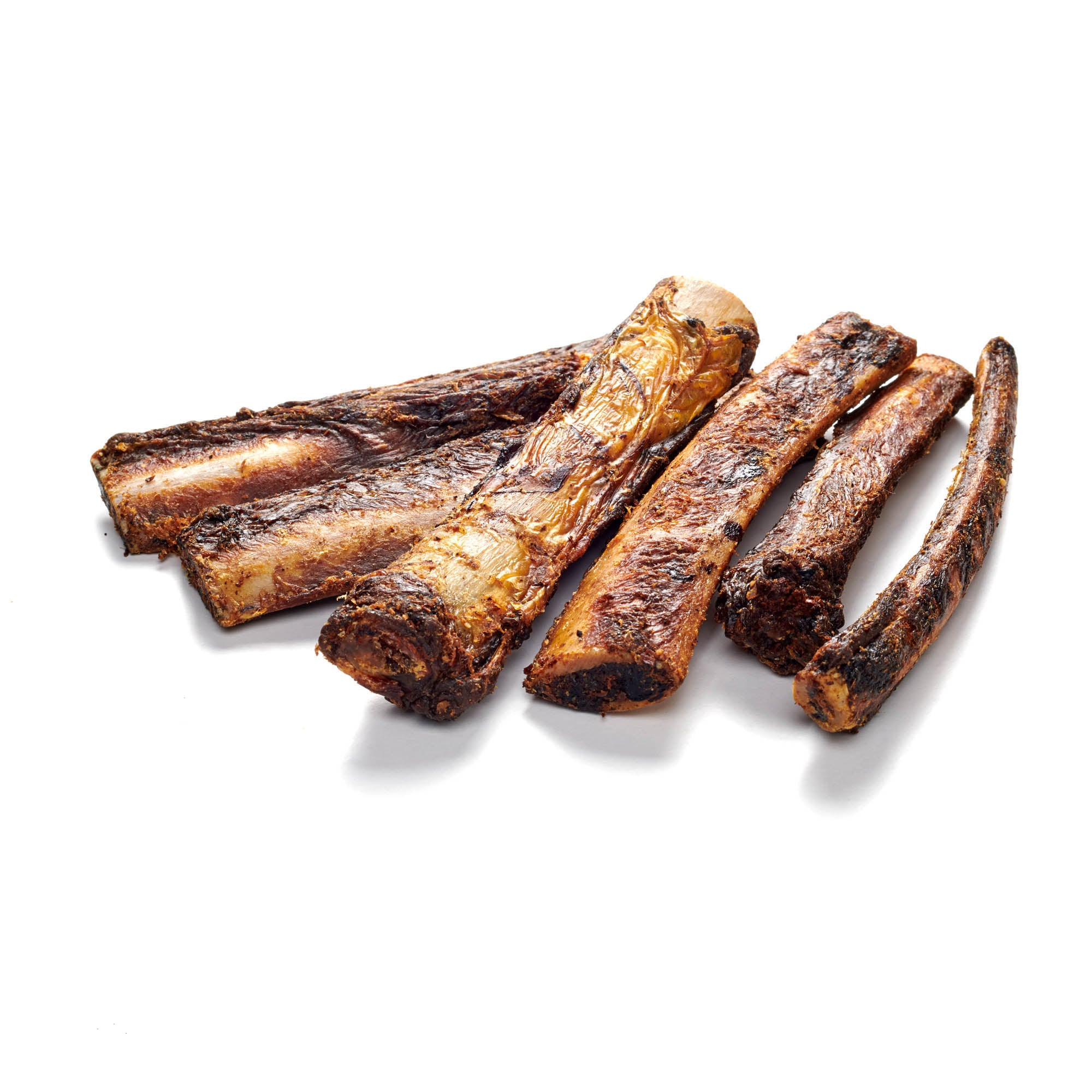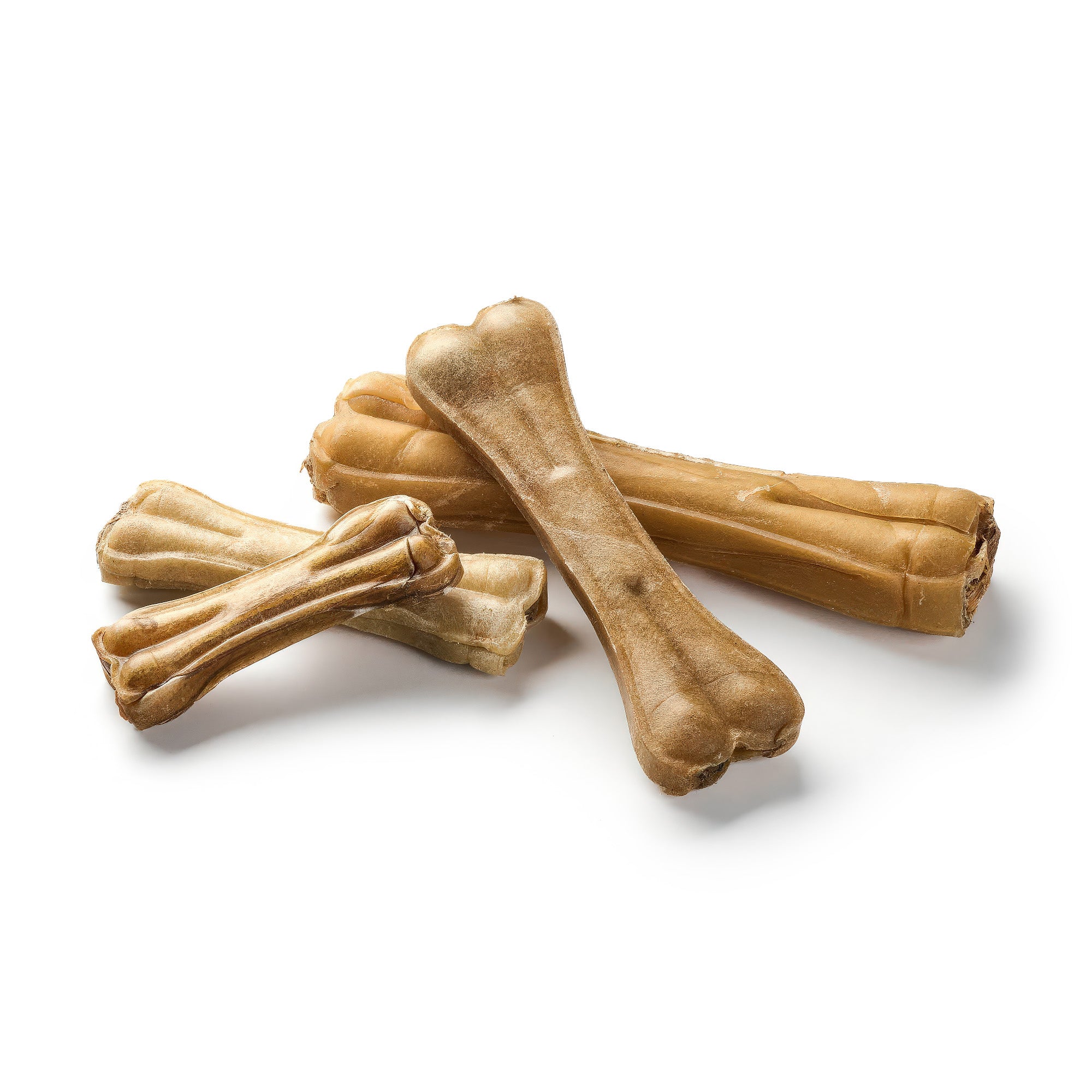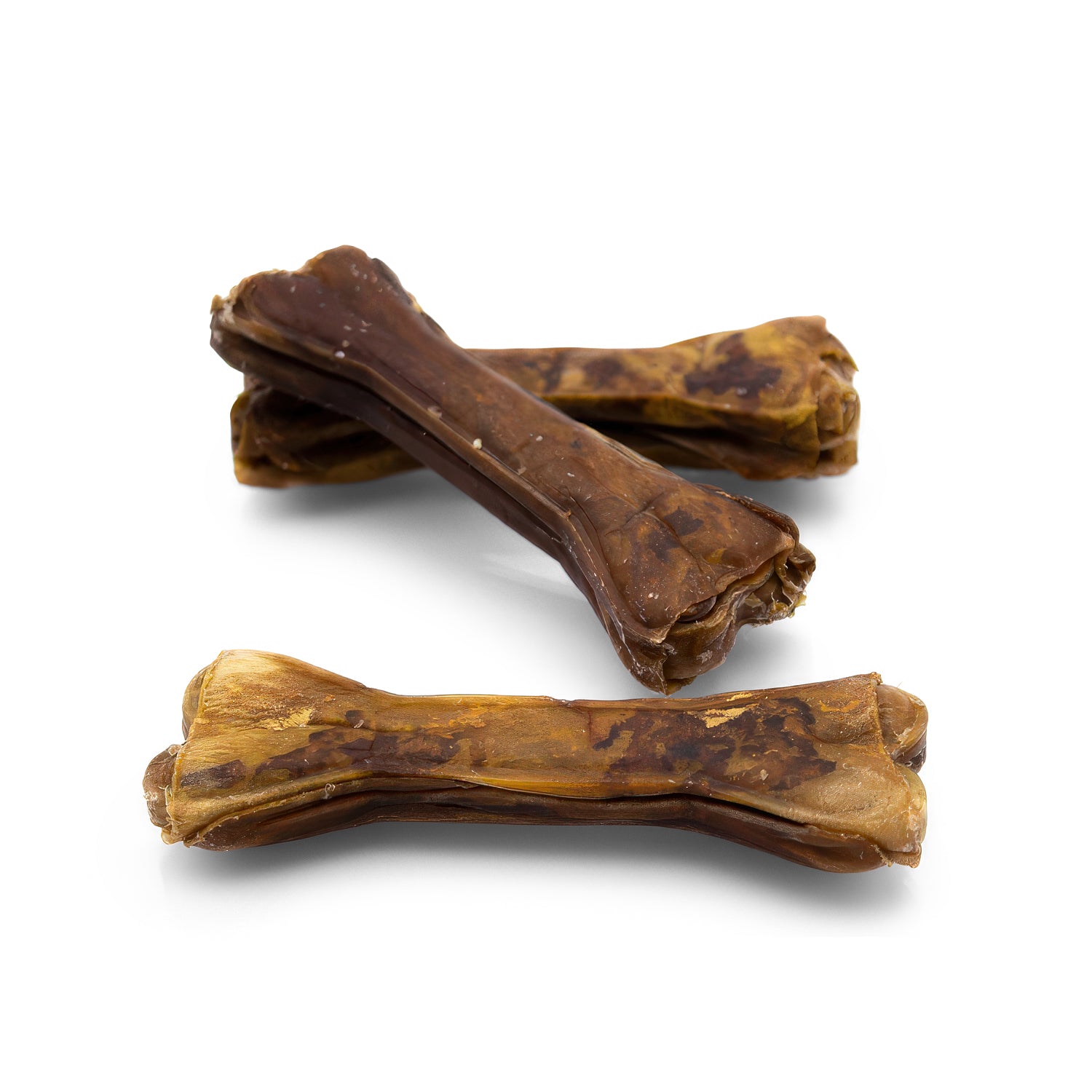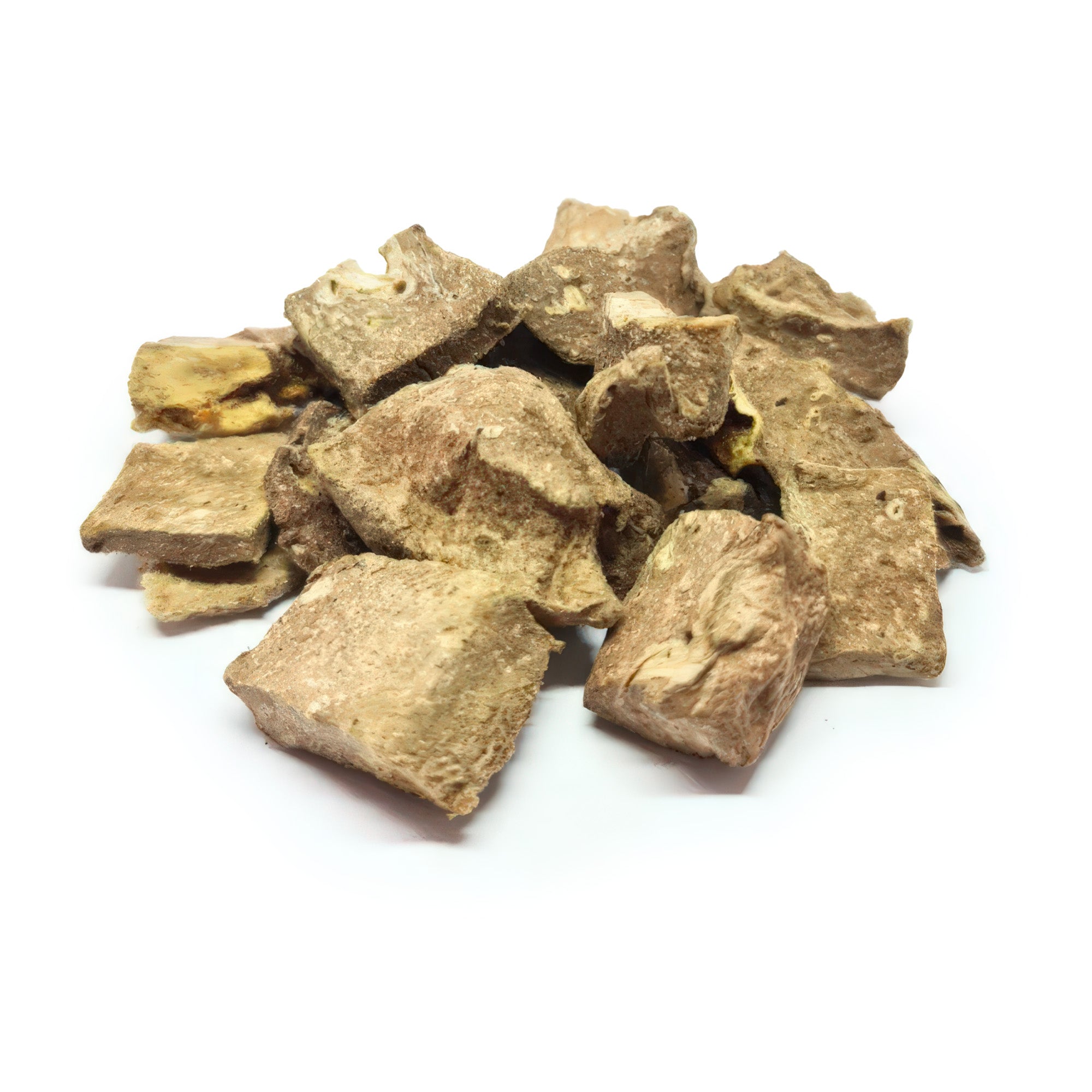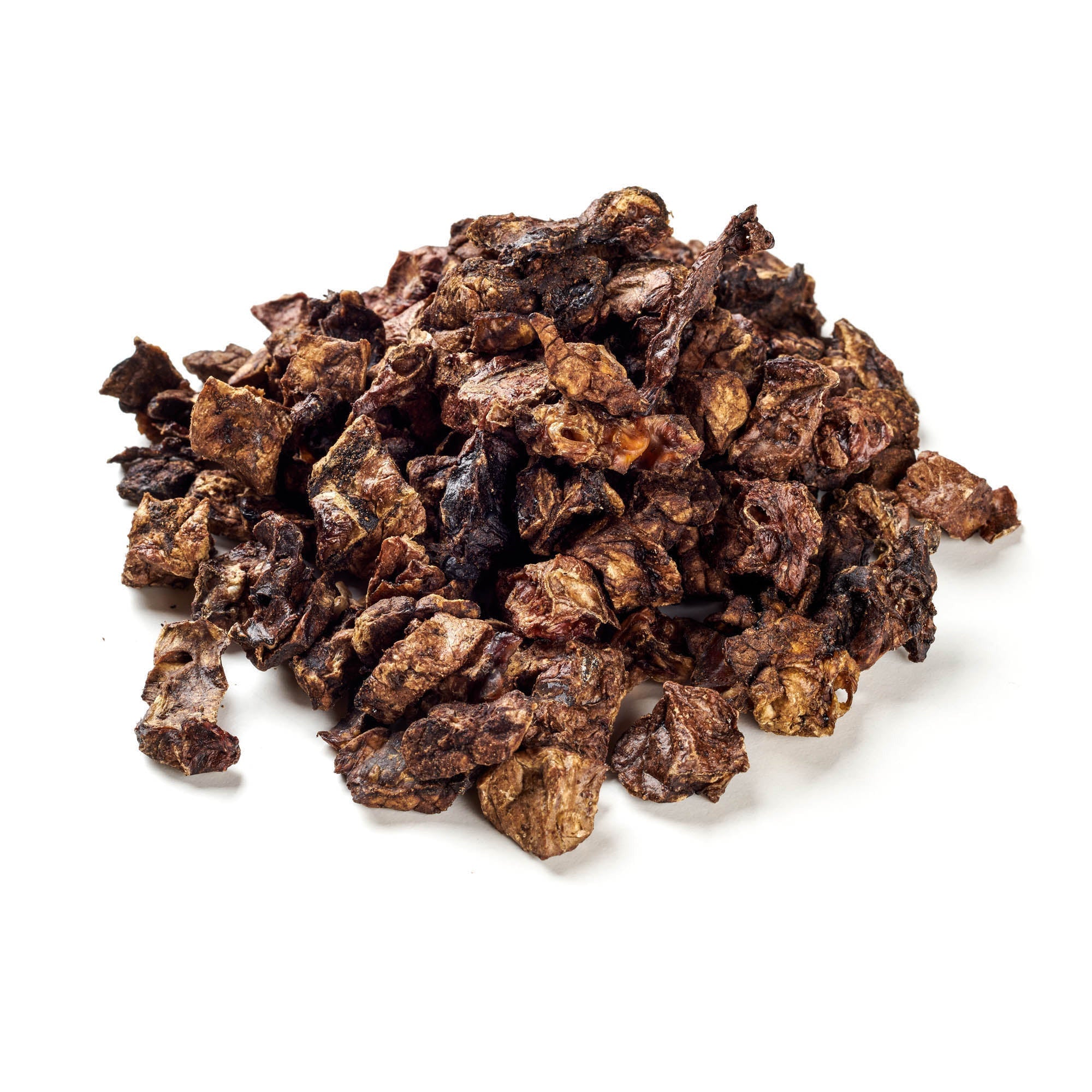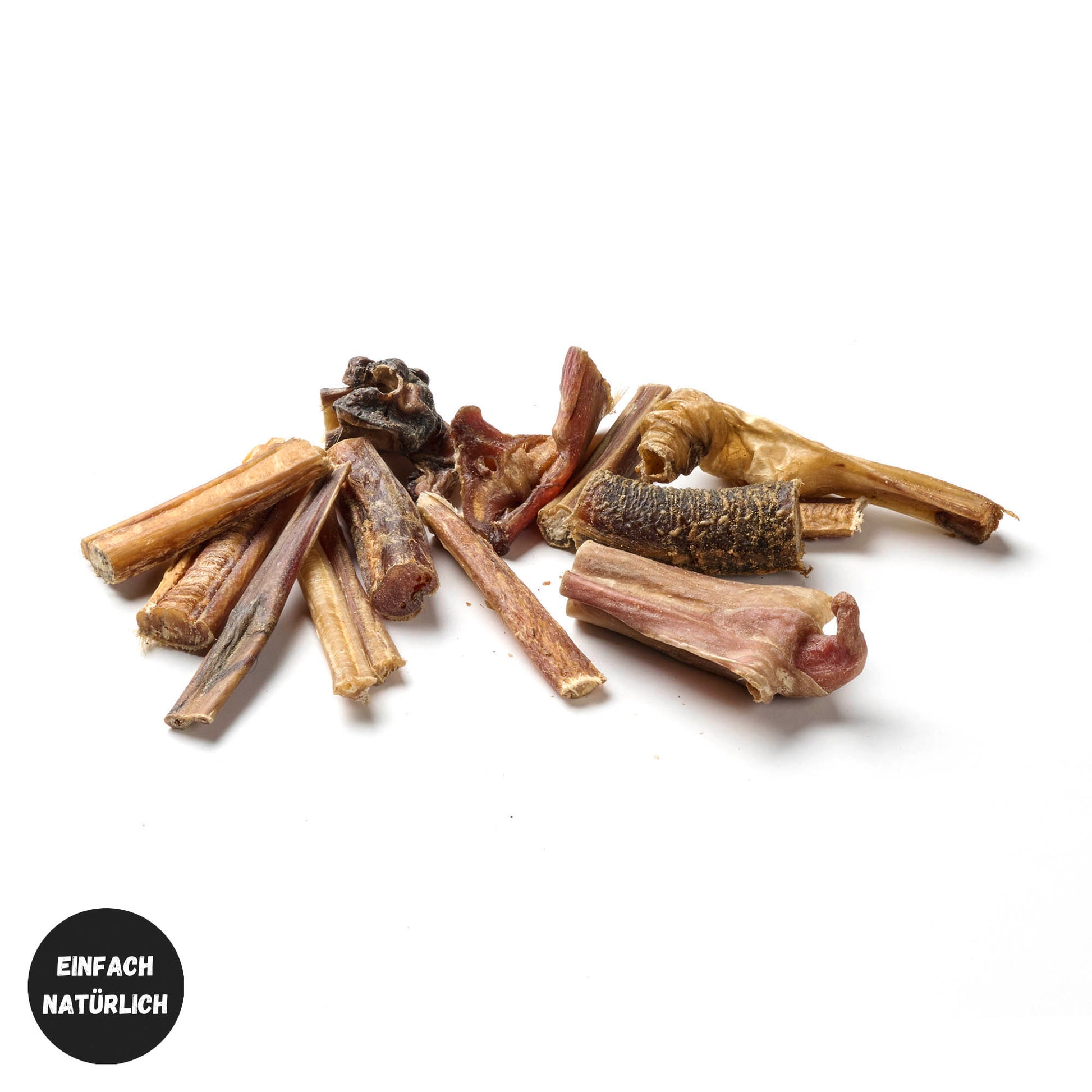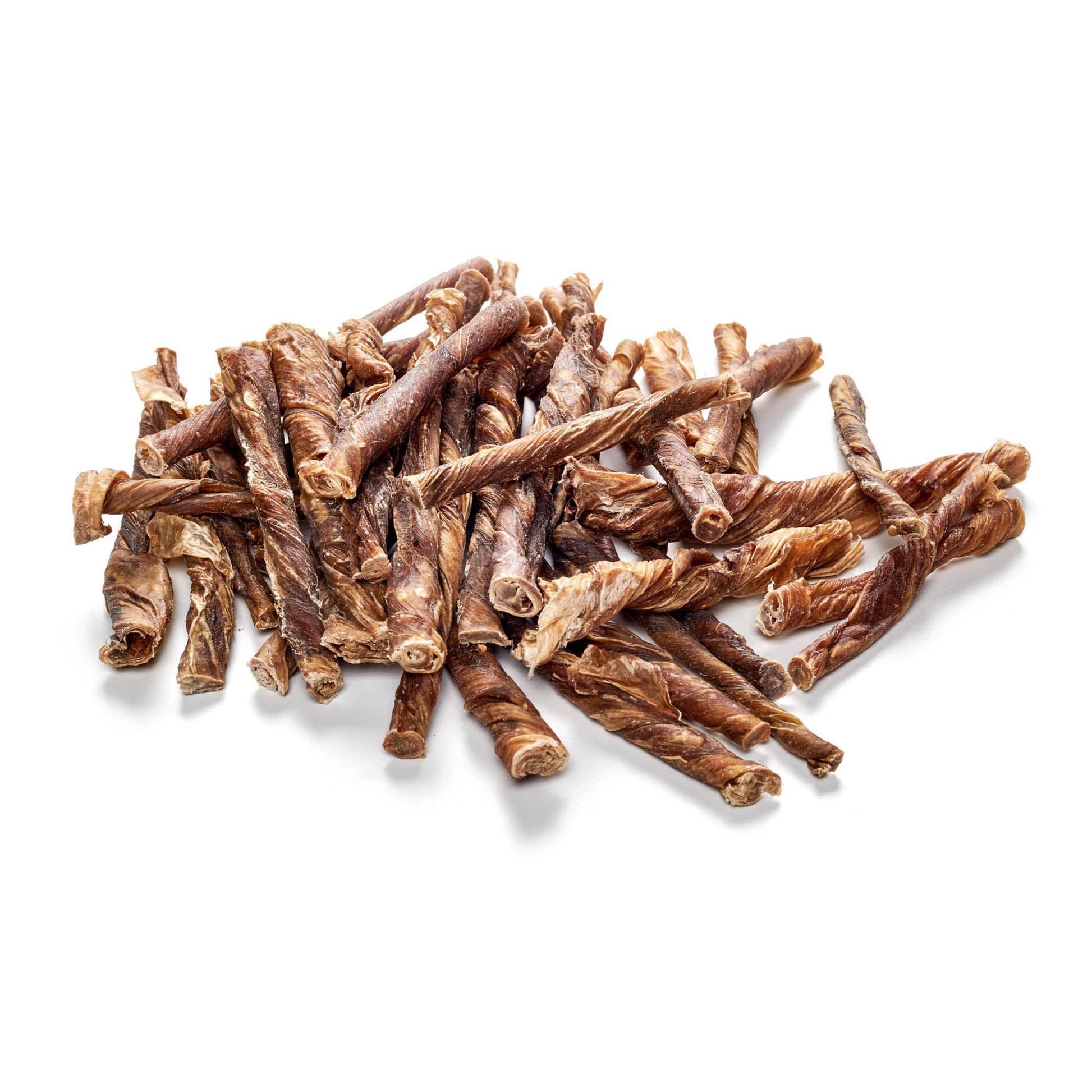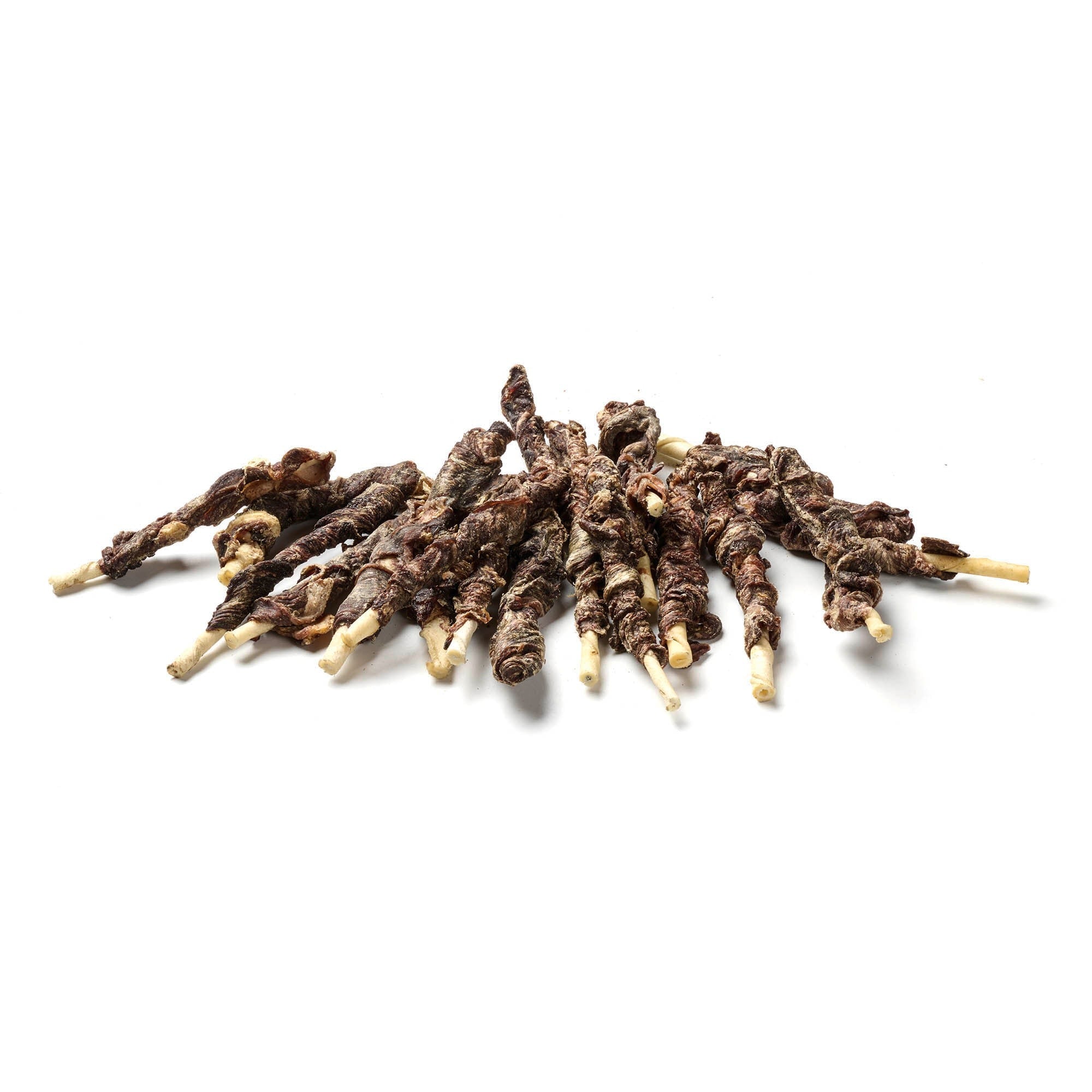
Bowel movements in dogs - what is normal?
Share
As a dog owner, you know the many little routines of daily life with your four-legged friend - from the morning walk to the evening cuddle on the sofa. One of these routines is the inevitable trip outside to do his business. It often seems like a simple, even mundane task: pick up the poop, dispose of it and move on. But this everyday act is much more than just a chore. Your dog's bowel movement is a small window into his health and well-being.
Contents: Bowel movements in dogs - what is normal?
- What is normal stool in dogs?
- Factors that affect bowel movements
- When should you worry?
- Diagnosis and treatment options
- Preventive measures for healthy bowel movements
- Conclusion
Enjoy moments together with our delicious dog chews!
Sometimes a walk to the park can turn into an unexpected adventure. You've probably experienced those moments when your dog suddenly sets his sights on a spot in the bushes with stoic seriousness, runs in circles several times as if following an invisible pattern, and finally does his business. Or the funny incidents when your dog decides to poop in the middle of the sidewalk, under the eyes of curious passersby. Such situations are not only sources of amusement and occasional embarrassment, but also valuable opportunities to take a look at your dog's health.
Your dog's stool can provide information about many aspects of his health. The consistency, color and smell of the stool can provide you, as an attentive owner, with important clues. Changes in these characteristics can be the first signs of serious health problems that would otherwise go unnoticed. For example, sudden diarrhea can indicate a food intolerance or an infection, while persistent constipation could indicate problems in the digestive tract.
There is hardly a situation that is as typical of life with a dog as the morning walk around the block, where you wait armed with a poop bag for your dog to do his business. But how often have you really paid attention to what these little piles say about your dog's health? In this article, you will learn why it is worth taking a closer look at your dog's stool, what characteristics make up healthy stool and when you might be better off visiting the vet. Your dog will thank you!
What is normal stool in dogs?
Normal dog poop should be firm but not hard, formed and slightly moist. This means that the poop should have a firm consistency so that it holds its shape when you pick it up with the poop bag, but not so hard that it appears dry or crumbly. The color of the poop varies depending on the type of dog food your dog eats, but is usually between medium and dark brown. Healthy poop should be a uniform color and not contain spots or streaks of different colors.
The smell of the stool is also an important indicator - even if it can take some getting used to. While it is normal for dog stool to have a certain smell, it should not be extreme or overpowering. An unusually strong or foul-smelling stool can indicate digestive problems or other health issues.
In addition, the stool should not contain any unusual components. These include:
- Mucus: A small amount of mucus may be normal occasionally, but if the stool regularly contains mucus, it may indicate intestinal inflammation or infection.
- Blood: Fresh red blood or digested blood that looks black are both serious warning signs. Red blood may indicate an injury in the lower intestinal tract or anus, while black blood could indicate problems in the upper digestive tract.
- Undigested food: Small amounts of undigested food may occur occasionally, especially if your dog has eaten something difficult to digest. However, if large amounts of undigested food are regularly seen in the stool, this may be an indication of digestive disorders or inadequate nutrient absorption.
Another factor to consider is the frequency of bowel movements. A healthy dog will typically have bowel movements once or twice a day, although this can vary depending on age, diet and activity level. Sudden changes in frequency, whether more or less frequent, can also be a sign of health problems.
By regularly observing your dog's bowel movements and paying attention to these characteristics, you can identify health problems early and, if necessary, take measures to ensure the well-being of your four-legged friend.
Make your dog happy with our delicious snacks!
Factors that affect bowel movements
Several factors can affect your dog's bowel movements. These include diet, age, activity levels and the dog's general health. A change in food or stress can also cause short-term changes.
Nutrition
The composition and quality of the food have a direct influence on bowel movements. A balanced dog food ensures that your dog's stool has the right consistency and color and is excreted in the right amount. Changes in diet, such as changing the type of food or giving new treats, can affect bowel movements. A high-quality dog food that is easily digestible and contains all the necessary nutrients promotes healthy bowel movements.
Old
Your dog's age can also affect bowel movements. Puppies often have softer stools because their digestive systems are still developing. Senior dogs , on the other hand, can be prone to constipation because their digestion slows down and they may be less active. Age-related diseases can also affect the digestive tract.
Activity level
Exercise plays an important role in digestive health. Regular physical activity promotes bowel movements and helps ensure regular bowel movements. A dog that spends a lot of time indoors and gets little exercise is more likely to suffer from constipation and other digestive problems, so it is important to provide adequate exercise to support intestinal health.
General health
Your dog's general health can have a significant impact on his bowel movements. Illnesses , infections and health problems such as allergies or parasites can affect the digestive tract and lead to changes in bowel movements. Regular veterinary examinations and careful observation of your dog can help to identify and treat health problems early.
When should you worry?
There are certain signs and situations where you should be extra alert and seek veterinary attention to ensure your dog stays healthy. Your dog's stool can provide a lot of information about his overall health, so it's important to watch for any abnormalities.
Persistent deviations
If your dog's stool remains abnormal for several days, this is a reason to take action. Changes in consistency, color or smell that last longer than one or two days should be investigated further. Persistent diarrhea or constipation may indicate serious health problems that require veterinary treatment.
Accompanying symptoms
In addition to abnormal bowel movements, you should also look for other symptoms that could indicate a health problem. These include:
- Vomiting: Frequent or persistent vomiting along with abnormal bowel movements may indicate serious digestive problems or other medical conditions.
- Loss of appetite: If your dog doesn't want to eat and loses interest in food, this could be a sign of an illness that also affects bowel movements.
- Lethargy: An unusually tired or sluggish dog could be suffering from an illness that also affects the digestive tract.
- Pain: If your dog shows signs of pain, such as whining, pulling away, or adopting an unusual posture, this could indicate a serious problem affecting bowel movements.
Sudden changes
Sudden changes in bowel movements with no obvious cause are also a cause for concern. If your dog suddenly has diarrhea or constipation despite no changes in diet or living environment, this may indicate an acute problem that needs to be investigated. Sudden changes in the frequency of bowel movements or the appearance of unusual components such as blood or mucus in the stool should also not be ignored.
Diagnosis and treatment options
If you are concerned about your dog's bowel movements, it is important that you see a veterinarian. The vet will perform a thorough examination to identify the cause of the problems and recommend the best possible treatment.
Examination and diagnosis
The veterinarian will usually begin with a comprehensive physical examination of your dog and a detailed medical history. He will ask questions about your dog's symptoms, diet and lifestyle habits. To determine the exact cause of the bowel problems, the following diagnostic measures can be taken:
- Blood tests: These help detect signs of infection, inflammation or other systemic diseases that could affect bowel movements.
- Fecal samples: Analysis of fecal samples can reveal parasites, bacteria, viruses or other abnormalities. This is especially important in cases of persistent diarrhea or blood in the stool.
- Imaging: X-rays, ultrasound or endoscopy may be used to identify structural problems in the digestive tract, such as tumors, foreign bodies or blockages.
Treatment options
Treatment depends on the diagnosis and may include different approaches to improve your dog's health and bowel movements.
First-class dog chews for happy sniffing noses available here!
- S pecial diets: Depending on the diagnosis, the veterinarian may recommend a special diet that is easier to digest or contains special nutrients. In case of food intolerances or allergies, a hypoallergenic diet may be prescribed.
- Medication: Depending on the cause, different medications may be prescribed. These include antibiotics for bacterial infections, a worming treatment for parasites, or anti-inflammatories and painkillers for inflammation or pain.
- Probiotics and prebiotics: These can help support the balance of gut flora and improve digestion. Probiotics are beneficial bacteria, while prebiotics promote their growth.
- Fluid therapy: In cases of severe diarrhea or vomiting, fluid therapy may be necessary to prevent dehydration and restore your dog's electrolyte balance.
- Surgical intervention: In rare cases, such as tumors or severe blockages caused by foreign bodies, surgical intervention may be necessary.
Aftercare and prevention
After diagnosis and treatment, it is important to continue to closely monitor your dog's health. Regular veterinary check-ups and careful observation of stools can help prevent relapses and ensure your dog's overall well-being. A balanced diet, adequate exercise and avoiding stress are also important factors in supporting the long-term health of your dog's digestive system.
With a timely diagnosis and the right treatment, you can help your dog get well again quickly and feel good.
Enjoy moments together with our delicious dog chews!
Preventive measures for healthy bowel movements
To support the health of your dog's digestive system and promote healthy bowel movements, there are several preventative measures you can take. These measures will help ensure your dog's well-being and identify and treat potential digestive problems early.
Balanced nutrition
A balanced diet is key to a healthy digestive system. Make sure your dog's food contains all the necessary nutrients in the right amounts. High-quality dog food or healthy chews with a balanced ratio of proteins, fats and fiber will support good digestion and ensure that your dog's stool has the right consistency and color. Avoid abrupt changes in diet, as these can stress your dog's digestive tract.
Regular exercise
Regular physical activity is important for your dog's overall health and digestive system. Exercise promotes bowel movements and helps ensure regular bowel movements. Make sure your dog gets enough exercise every day, whether through walks, playing, or other physical activities such as dog sports . Older dogs in particular benefit from regular, gentle exercise to prevent digestive problems such as constipation.
Stress avoidance
Stress can have a significant impact on your dog's digestive health. Dogs are sensitive to changes in their environment and routine. Try to minimize sources of stress and create a calm, stable environment for your dog. Regular daily routines, adequate rest periods, and positive interactions will help reduce stress and promote overall health.
Regular veterinary examinations
Regular visits to the vet are crucial to monitoring your dog's health and identifying potential problems early. The vet can perform routine exams, update vaccinations, and analyze stool samples to ensure there are no parasites or other health problems. Early detection and treatment of health problems can help prevent serious illnesses and improve your dog's quality of life.
Sufficient water intake
Adequate water intake is important for healthy digestion. Make sure your dog has access to fresh, clean water at all times. Good hydration helps support bowel function and prevent constipation. Make sure your dog drinks enough water, especially on hot days or during periods of increased physical activity.
By incorporating these preventative measures into your dog's daily routine, you can help promote his digestive health and detect potential problems early. Healthy stools are a sign that your dog is feeling well and that his digestive system is functioning optimally.
Conclusion
Your dog's stool is an important indicator of his overall health. By paying attention to changes and consulting a veterinarian when necessary, you can help keep your dog healthy and happy. A balanced diet, regular exercise and preventative measures are key to a healthy digestive system.
It is worth regularly observing your dog's stool and looking for anything unusual. Changes in the consistency, color or smell of the stool can be the first signs of health problems that require a veterinary examination. By following the preventative measures mentioned above, such as a balanced diet, sufficient exercise, avoiding stress and regular veterinary examinations, you can avoid many digestive problems and support your dog's health in the long term.
Your watchful eye and care are crucial to ensuring your dog's well-being. Healthy dog poop is not only a sign of a well-functioning digestive system, but also of the overall well-being of your loyal companion. By following these simple but important measures, you will help ensure that your dog lives a long, healthy and happy life.
Bring joy to your dog's day with our treats!
latt.jpg?v=1708787219&width=1946" alt="Veal shoulder blade">


